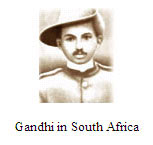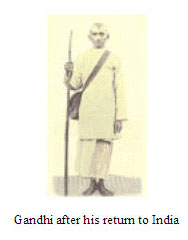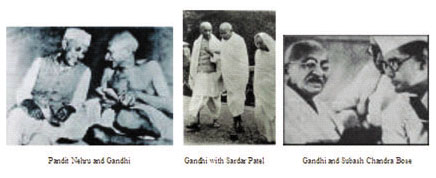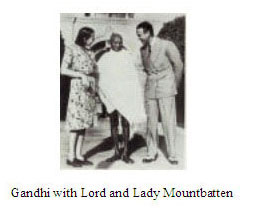MAHATMA GANDHI
(Oct 2, 1869- Jan 30, 1948)
“Generations to come will scarcely believe that such a one as this ever in flesh and blood walked upon this earth” Albert Einstein

"I am prepared to die, but there is no cause for which I am prepared to kill” Gandhi
As the father of the nation, Mahatma Gandhi is revered by people of all religious persuasions in India and by countless millions all over the world. While a confluence of great leaders such as Pundit Jawaharlal Nehru, Vallabhabai Patel and Subhash Chandra Bose had played seminal roles in India’s gaining independence from Britain, Gandhi was peerless…a cut above all the others. The peaceful but profoundly effective tactics of “Satyagraha” (a rough translation of this would be “quest for truth”) and its components, civil disobedience and peaceful non-cooperation would prove adequate to drive Britain from power in India. Gandhi’s influence was so profound that with a new round of fasting he could halt some of the worst communal riots. His ability to move the masses so infuriated and frustrated the British, that they were afraid to imprison or otherwise punish him. After gaining independence, true to form, Gandhi refused to occupy any position in the administration.
The relevance of Gandhi and his methods would become evident in the five decades following his assassination. Many of the British colonies gained their independence soon after India’s. Examples are Sri Lanka, Malaysia, Singapore and the Caribbean nations such as the West Indies. Gandhi’s peaceful methods would prove effective for American blacks in their struggle to gain civil rights. So too would they prove useful in overcoming oppression and racial injustice in the form of apartheid in South Africa. A more indirect example is the struggle in Poland in the twilight years of the millennia, in their struggle to overthrow communism. The architects of all these struggles have become ‘icons’ in their own right and each has been awarded a Nobel peace prize. Thus, in naming Gandhi as a runner-up for the “Person of the Century” by the Time Magazine, these “Children of Gandhi” were also recognized. They were: Rev. Martin Luther King, Nelson Mandela and Lech Walesa. While these are shining examples, one wonders why Gandhi’s example has not been adopted by other groups such as the IRA (in Northern Ireland) or the Palestinians in their endless struggles against their perceived oppression by Israel. Perhaps another great leader in their midst is a necessary prerequisite for such oppressed peoples to recognize the potent weapon Gandhi devised and unleashed against the mighty British!
<
Whatever the immediate legacy of Gandhi in the world scene is, in Indian History he will surely be regarded by many to be as influential as Ashoka the Great or the Buddha or Adi Shankaracharya. It is thus ironic that, although nominated five times for Nobel Peace prize (1937, '38, '39, '47 and 1948), Gandhi was never awarded it! Although each of the “Children” of Gandhi won this prize and the Nobel Peace Prize Committee had considered a posthumous award, it never materialized. This glaring omission will remain a ‘black-eye” on the Nobel Peace Prize Committee for a long time to come!
GANDHI’S LIFE AND ACHIEVEMENTS
I will discuss Gandhi’s life in the following sections:
A) Early life
B) Time spent in South Africa
C) Gandhi’s involvement with India’s struggle for independence
D) Gandhi’s legacy
A) EARLY LIFE:
Gandhi was born on October 2nd, 1869, in Porbander, in the modern state of Gujarat. His father, Karamchand Gandhi, was the Chief Minister (‘Divan’) of Porbander. His mother, Putlibai was deeply religious and was primarily responsible for Mohandas growing up steeped in Vaisnavism and Jainism. Gandhi's ascetic tendencies were thus quite natural. What is most unexpected and surprising is how this very shy and diffident boy, who was uncomfortable in public speaking, would become a leader among leaders and shake up the whole colonial system!

In 1889, at the age of 19, Gandhi left for England to study law. His stay in London would expose him to alien customs and, at multiple levels, cultural shock. Nevertheless, many of his special characteristics took root and grew during these formative years. He tried consuming meat and alcohol but would reject both, soon. In fact, he met some European vegetarians and food faddists and joined their London Vegetarian Society. There he met sociologists, theosophists and philosophers such as Annie Besant, George Bernard Shaw and Edward Carpenter. After reading Sir Edwin Arnold’s English translation, he became interested in the teachings of Bhagavad-Gita. Gandhi was also introduced to, and influenced by, the teachings of Jesus Christ. While these would leave lasting imprints on his young mind, during his years in England there were no hints of the enormous role he would play in the political life of India and Indians in South Africa. After he was admitted to the English Bar, he returned to India.
(When asked what he thought of the Western civilization, Gandhi said: “I think it would be a good idea!”)

B) TIME SPENT IN SOUTH AFRICA:
“We must become the change we want to see in the world” Gandhi

After returning to India, Gandhi first set up a law practice in Bombay. Two years later, with little success in his profession, Gandhi moved to South Africa. A series of incidences in South Africa exposed him to the harsh racial injustice Indians in that country endured. In response, Gandhi developed systems for dealing with the injustice. He coined the term “Satyagraha” (literally, “search for truth”) for the system of passive resistance and civil disobedience. His impetus for developing this system was the belief that, in the face of oppression, the suffering endured by the victims would weaken the oppressor and strengthen the oppressed. In addition to the non-violent traditions that he was brought up with, he borrowed heavily from Hinduism and Jainism and the teachings of Jesus Christ. He was also profoundly influenced by the writings of Leo Tolstoy and the ideas promulgated in the American writer Henry David Thoreau’s essay “Civil Disobedience”.
In the course of the twenty years of his stay in South Africa, Gandhi influenced the events that affected South African Indians. His non-violent methods not only gave Indians a potent way of fighting racial injustice, the Indians felt a real sense of empowerment by it. In turn, Gandhi emerged as the pre-eminent leader of Indians; his prestige spread to India. Gandhi also changed in the process, both physically and socially. His clothing habits gradually changed. By the time his call came to use his considerable talents in India, Gandhi looked more like a commoner than an English-educated barrister. By then, he also had a considerable following; this included both Indians and non-Indians. That translated to more bargaining power, and consequently, Gandhi could get several key concessions from the government of South Africa. One such concession was the abolition of the poll tax.
C)GANDHI’S INVOLVEMENT IN INDIA’S STRUGGLE FOR INDEPENDENCE:
“An eye for an eye makes the whole world blind” Gandhi
Before Gandhi’s appearance on the scene, the politicians of India were mostly English-educated barristers, from well-to-do families. Their activities were largely confined to calling meetings in large cities and conducting rallies. As they were not perceived to be any real threat, the British allowed such meetings, and the usual state of affairs was for the meetings to close after many speeches without anything of importance having been achieved. Although the speeches had substance, and the Indian public in general supported their exhortations, they were not moved by them sufficiently to become a potent political movement.

All that changed with the appearance of Gandhi on January 9, 1915. First, the Indian public could easily identify themselves with Gandhi, as one of them. Second, rather than making bombastic speeches, Gandhi gave the masses means to affect change. Through Satyagraha’s peaceful non-cooperation and civil disobedience, Gandhi could show the public the way to really affect the policies of the British. During the acts of civil disobedience, Gandhi and his followers would frequently be imprisoned; they courted such arrests gladly. However, with each such incarceration, Gandhi’s strength grew. When the response of the Indian public to his call turned violent, he used fasting to rein in control. When the British response to a particular incident was excessive, again Gandhi resorted to fasting, instead of a call for arms. In response to the massacre at Jalianwalla Bagh, where 400 innocent civilians were gunned down, Gandhi fasted. When the British imposed tax on salt, Gandhi led a march to the sea and, symbolically made salt by evaporating sea water. This “salt march”, on May 5, 1930, ended in imprisonment of Gandhi. Another major campaign of Gandhi was the “Quit India” movement, which accelerated the process of British disengagement with the Indian subcontinent.
Gandhi’s recognition of the fact that 85% of the Indian masses resided in villages was the reason for his push for promoting cottage industries and self-reliance. This was the impetus for his popularizing the spinning wheel (Gandhi is seen using this in the first picture in this article). He recognized the transfer of wealth that resulted from the British export of raw material from the colonies to Britain and the importation of manufactured goods to these same colonies. This was his “Swadeshi” (nationalist) approach; this would complete the formula for wrenching independence from the British. Indeed, this formula did achieve the intended result; on August 15th, 1947, India was granted independence. The Swadeshi movement and the focus on local, rural India were not followed by the leaders of Independent India, however. Instead, the industrialization of India, coupled with the emphasis on education would form a potent recipe for propelling a technologically advanced India into the 21st century. Gandhi was assassinated by Nathuram Godse, a Hindu fanatic, on his way to a prayer meeting on January 26th, 1948.


D:GANDHI’S LEGACY:
In order to understand Gandhi’s legacy, one needs to look at how he formulated his potent methods to first usurp, and then topple British power. In order to achieve the end result, Gandhi avoided violence toward the oppressors but he believed that, like soldiers, the activists must be willing to die for the cause. His methods aimed at achieving a ‘change of heart’ of the oppressor(s), but this change of heart did not come directly from Gandhi’s actions. When he and his followers broke the law as a part of ‘civil disobedience’; they did it ‘politely’ (in other words, in a ‘civil’ fashion). Then, they courted the punishment, which included imprisonment, gladly. With repeated cycles of civil disobedience, in response to the public’s reaction, the oppressor acted in ways that would be discerned as a ‘change of heart’. This was the indirect effect Gandhi wanted. And it worked.
Gandhi laid down several rules about civil disobedience. First, only individuals who had high regard for law would qualify for participating in this action. Second, only certain, unjust laws would be broken. Third, no direct action, such as physically blocking someone, was allowed. Destruction of property and bad or hostile language were banned. The use of non-cooperation (which is only a part of civil disobedience) was also done in a civil manner, with courting torture or imprisonment cheerfully. This was recognized as a potent method to change the heart of the punisher, as well as to weaken him, with the public refusing to obey his orders any more. Gandhi’s non-violent means, in the end, achieved the result with a surprising win-win for both sides. This is the most surprising aspect of this form of liberation; the British left India as friends and not as bitter foes!

While the true impact of Gandhi will be determined by historians in the centuries to come, the following tributes by Gandhi’s contemporaries and intellectuals will serve as timely glimpses of the high esteem by which he is held even today:
Pundit Jawaharlal Nehru wrote: “Gandhiji’s mind is more logical, his devotion more single-hearted, his passion less varied and more intense, his courage and his willingness and capacity to suffer much greater than Tagore’s. He is the warrior and the crusader of India’s new humanity as Tagore was its herald and its bard”
The Rt. Hon. V. Samuel wrote: “What other living man…can survey achievements such as these-leadership in uplifting the spirit and exalting the dignity of a vast nation; leadership in showing the world of today and of tomorrow that the greatest results in the field of public affairs, can be won by the sheer power of human spirit, without the brutality of force; leadership in rescuing from degradation, that has lasted through century after century, tens of millions of victims of injustice?”
Rabindranath Tagore wrote: “The secret of Gandhi’s success lies in his dynamic spiritual strength and incessant self-sacrifice. Many public men make sacrifices for selfish reasons. It is a sort of investment that yields handsome dividends. Gandhi is altogether different. He is unique in the nobility. His very life is another name for sacrifice. He is sacrifice itself.
He covets no power, no position, no wealth, no name and no fame. Offer him the throne of all India, he will refuse to sit on it, but will sell the jewels and distribute the money among the needy.
He is a liberated soul. If any one strangles me, I shall be crying for help; but if Gandhi were strangled, I am sure he would not cry. He may laugh at his strangler; and if he has to die, he will die smiling.
His simplicity of life is child-like, his adherence to truth is unflinching; his love for mankind is positive and aggressive. He has what is known as the Christ-spirit. The longer I know him, the better I like him. It is needless for me to say that this great man is destined to play a prominent part in moulding the future of the world”
Rev. C.F. Andrews wrote: “In him from the first, I felt instinctively that there had come into the world, not only a new religious personality of the highest order, moving the hearts of men and women to incredible sacrifice, but also a new religious truth, which yet was not new, but old as the stars and everlasting as the hills. His one Message was that long suffering and redeeming love alone are invincible”.
Yone Noguchi sang:
“A warrior in combat near Heaven with a
prospect of unseen victory,
Blowing a bugle that rings to the last
gulf of Hell,
A lonely hero challenging the future
for response,
Withered and thin,
But with a mammoth Soul, shaking the world in fear,
Through this man, love profaned and ignored
Through this man, life’s independence
shattered and fallen,
Through this man, body labour, bereft of
honour and prize,
Cry rebel-call against tyranny; to God’s
justice be praise.
A sad chanter of life close to the
mother earth,
(Where is there a more burning patriot
than this man?)
A lone seeker of truth, denying the night
and self-pleasure,
(Where is there a more prophetic soul than
this man’s?)
A pilgrim along the endless road of hunger and
Sorrow.
J.H. Holmes wrote: “When I think of Rolland, I think of Tolstoy. When I think Lenin, I think of Napoleon. But when I think of Gandhi, I think of Jesus. He lives his life; he speaks his words; he suffers, strives and will some day die, for his Kingdom upon Earth”
Albert Einstein wrote: “ A leader of the people, unsupported by any outward authority; a politician whose success depends not upon craft, nor mastery of technical devices, but simply on the convincing power of his personality; a victorious fighter who has always scorned the use of force; a man of wisdom and humility armed with resolve and inflexible consistency, who has devoted all his strength to the uplifting of his people, and the betterment of their lot; a man who has confronted the brutality of Europe with the dignity of the simple human being, and thus at all times risen superior.Generations to come, it may be, will scarce believe that such a one as this, ever in flesh and blood, walked upon this earth.”
Pearl S. Buck wrote: “He is one of the greatest leaders of people, that there have been in human history. Such a leader comes only at the confluence of the people’s need and desire, with the birth of an individual, able by his natural gifts, to fill that need and express that desire. I never doubt for a moment that Gandhi’s purposes will be achieved. He has brought his people to the very gates of liberty. If they are not opened, the people of India will open them”.
Romain Rolland sang:
“ O Tagore, O Gandhi,
Rivers of India.
Who
Like the Indus and the Ganges,
clasp within your double embrace,
the Orient and the Occident-
the latter,
a tragedy of heroic action,
the former,
a vast dream of light-
both streaming forth from the home of God
on this world,
tilled by the ploughshare of
Hate and Violence,
Scatter His Seeds”.
BIBLIOGRAPHY:
1) Encyclopedia Britannica: vol. 19, pp 650-54, 1989
2) Mark Shephard in “Gandhi Today” on “Successors of Gandhi in India and around the world". Simple
Productions, Arcata, California and Seven Locks Press, Washington D.C. 1987
3) “Light of India: A message of the Mahatma” by M.S. Deshpande, Wilco Publishing House, 1958
4) http://nobelprize.org/peace/articles/gandhi/
5) http://www.kamat.com/mmgandhi/Gandhi.htm
6) http://www.mkgandhi.org/chronosketch.htm

“The only tyrant I accept in this world is the still voice within” Gandhi